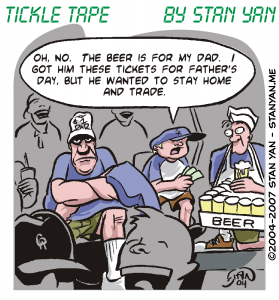One of the few undisputed facts of trading is that you must risk money to make money. The risk would be easy if we were assured a successful outcome, or if we didn’t care. (Gomez Adams, the patriarch of the “Adams Family,” for example, never seemed to care how much he lost in the markets because he had so much money that it didn’t make a difference.) Most traders have trouble taking a risk. We are neither oblivious to the potential losses nor excessively rich. Losses matter and most of us can’t stand to lose. It’s easier to be safe, but we all know too well that we can never be profitable traders if we play it safe. We must take a risk. But how can we take a big risk and live with the consequences?
Whether you’re a novice trader with a small account, a seasoned trader trying to trade larger positions, or a hedge fund manager merely trying to satisfy client expectations, you must increase your risk tolerance, put your money and ego on the line and move beyond your comfort zone. If you are good at fooling yourself, taking a risk isn’t hard at all. The naïve optimist has it easy: “I’ll just make a big bet, the markets will go my way, and I’ll meet my profit objective.” We’ve all learned the hard way, though, that such a thinking strategy works for about two weeks at best. Sooner or later, we find that it is virtually impossible to trade profitably over the long term.
Some make it, but much more blow out their accounts long before that happens. Most traders avoid taking a risk because they perceptively realize that there’s a pretty good chance they are going to lose more money than they make. The challenge is to both know that you are likely to take substantial losses, while at the same time, you continue to trade, take risks, and strive for consistent profitability.
We are the most risk-averse when we fear the outcome of taking a risk. When the worst-case scenario seems unbearable, we shrink back, paralyzed and defeated. On any given trade, we can alleviate some of the fear by risking a small percentage of our trading account on a single trade, and taking it “one trade at a time” instead of focusing immediately on the onerous goal of achieving a specific return across the entire series of trades.
If you can avoid ever thinking of the long-term goal, you could probably trade forever without hesitation (Indeed, some people merely add to their account every month to cover losses and never have to face the possibility that they can’t trade.) Most of us, however, must eventually take stock of how well we’re doing as a trader.
That’s the hard part, looking at how profitable you really are, and being able to live with what you find out. The fear is discovering that we can’t trade profitably, or even worse, that we’ve lost thousands of dollars with nothing to show for our time and effort. This potential worst-case scenario lurks at the back of our mind and can subtly impact our ability to take risks if we aren’t careful.
It may not be simple, but it is worth facing the worst-case scenario and trying to come to terms with it. First, you might consider a variation of the old saying, “it is better to have loved and lost than to have never loved at all.” Similarly, if you yearn for wealth and financial security, it is better to have attempted trading and blown out a few times than to complacently wish you had tried and spent the rest of your life regretting that you never mustered enough courage to have taken a big risk and seen for yourself whether or not you could realize your dreams. This is a powerful statement.
Suppose you do indeed blow out your account to the point that it will take years to build up a stake and try again. At least you know that you had tried. Some people never have the courage to try something as challenging as trading. They play it safe and regret that they never took the chance, all because they fear that they will be unable to handle the disappointment should they fail. Others take the position that failure may be unpleasant, but stagnation and false complacency are worse.
If you take the position right now that it is valuable for you to take a risk and discover what your potential destiny is, you’ll be much less averse to risk. You’ll feel courageous and ready to meet the challenge. If you psychologically face and conquer the worst-case scenario and decide right now that even blowing out your account has a positive impact on the view you have of yourself, you’ll be less averse to risk. (Again, even if you blow out your account, you can always relish the fact that you tried to achieve your dreams.) And paradoxically, the less averse to risk you are, the more risk you’ll take, and as long as you use sound trading methods, you’ll probably trade consistently and profitably.


